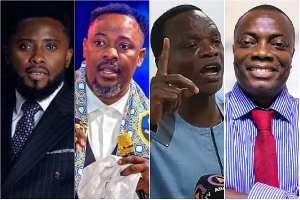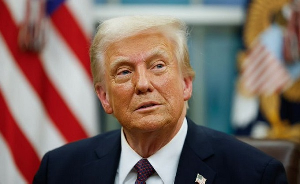I have not had the opportunity of reading Dr. Addo Kufour’s memoire titled “The Gold Coast Boy” which was launched recently. As to where I will get a copy of the book to read, only God knows because where I dwell in my holy village, getting access to such an important book is very difficult. That is one of the disadvantages of living in a village. But if I eventually get a copy, there will be no breakfast, lunch or dinner until I finish reading it.
The issue of memoires, like legacies, are treated lightly in this part of the world. A memoire, according to my Webster’s Dictionary of Contemporary English is a literary genre or a reminiscence, a subclass autobiography. Our leaders play their roles and leave the scene without leaving behind their memoires, thereby leaving us guessing on issues which happened when they were at the helm of affairs.
In fact, we even do not know how they started and what went wrong or right in their lives. I had cause to write in this column for the umpteenth times that I love historians because they always look back. By looking back they learn and easily predict what will happen in future if the past is not corrected. People have their sordid past and their glorious moments.
If such sordid past and glorious moments are captured in their memoires, they go a long way to serve as lessons for generations yet unborn. Dr. Addo Kufour has set the ball rolling and I hope others will follow suit.
I doff my hat for the gentleman. For nearly a decade, I have studied this medical doctor turned politician and like many other Ghanaians, we all seem to agree on some other things about the man. He is polite, meticulous, disciplined, efficient and highly focused and above all he loves systems and order. The universal applied adjective is PRAGMATIC. The man is so colourless, so ordinary a man you cannot pick him out from a crowd. No wonder as a Minister of Defense, he was able to raise the image of the Ghana Armed Forces to the highest level before leaving office.
When Henry Kissinger wrote the “Shuttle Diplomacy”, his memoire, it became a sell out in not only the US but the whole world. After reading this memoire of the former US Secretary Of State, you will refuse to put the book down but read it again and again. In January and May 1974, Kissinger engaged in “Shuttle Diplomacy”, a term coined by the members of the media who followed Kissinger on his various short flights among Middle East capitals as he sort to deal with the fallout of the October 1973 war.
After three weeks of fighting, a ceasefire found Israeli forces entangled with the Egyptian and Syrian forces. This presented President Richard Nixon with an opportunity to play a lead role in disengaging these armies from one another and possibly laying the groundwork for further steps to peaceful resolve of the twenty five-year old conflict.
In January 1974, Kissinger helped negotiate the first Egyptian-Israeli disengagement in eight days and in May he arranged a Syrian-Israeli disengagement after a mouth of intense negotiation. Kissinger’s “Shuttle Diplomacy” secured one last deal in September 1975 with the conclusion of a second Egyptian-Israeli disengagement agreement. If Henry Kissinger had not written his memoire, the secret as to how the issue was settled would have been very illusive.
He narrated the sleepless nights he had on board his plane and the entrenched positions of the three countries. It was in his memoire that people came to understand the deep hatred the Arabs had for the Israelis and how Israel insisted that “Never Again” will they allow themselves to be uprooted from the holy land.
Dr. Kwame Nkrumah, the first president of Ghana wrote many books but sadly the nearest he came to writing his memoire was the one he wrote when he was in exile in Guinea, titled “Dark Days In Ghana”.
Even in that book, he only recounted the circumstances which led to the 1966 coup and the betrayal of his own people. When the book came out, the Khaki Boys banned it from circulating in Ghana.
It was illegal for anyone to be seen holding that book. As students in those days, the only copy we had on campus was kept so secret that any of our colleagues who wanted the book to read had to hide the book in his bag and read it in the night while on bed. The only student who had a copy of the Dark Days In Ghana was called Ekow Biney and so anyone who wanted the book will refer to it as “Ekow Biney” because we had prying eyes planted by the khaki Boys to see to it that no student had a copy of the book.
Of all the interesting life stories of Professor Kofi Abrefi Busia, he did not write his memoire and eventually died with all what he knew and which could have helped the nation if he had put pen on paper.
When the good professor went into exile after he was overthrown by the Khaki Boys he had a fine opportunity to write his memoire as Dr. Nkrumah did but he missed the opportunity and died with his fine brains.
As students in those days we used to refer his name BUSIA as “Best University Student In Africa.” We used to tease Colonel Acheampong who overthrew Busia with this since the best qualification that Acheampong had was RSA Stage II from Swedru Business School. That was why we used to call him “Swesbu”.
Enter Dr. Hilla Limann, a diplomat par excellence.
Even though like Busia, he had a very short time in office, he lived in this country for twelve years before his untimely death. He too could have seized the opportunity to write his memoire to set certain records straight, he did not do so and left behind rumours.
For all what you know, Limann never received any End of Service Benefit and neither did the state provided him with accommodation not to talk of any upkeep. The man lived in this country for twelve years and died a poor man. Of all the charges leveled against him by Rawlings and his PNDC, he was never taken to court. When he fell sick, he could not get money to receive treatment at the Korle Bu Teaching Hospital.
Out of anger he wrote in his will that when he died Ghanaians and the government for that matter should not give him any State Burial. When he died, his body was driven in a rickety car from Accra to Gwellu, his hometown where he was buried among his ancestors. Not a drum was heard and not a soldier discharged any farewell shot.
The day ex-president Kufour paid a visit to the tomb of Dr. Limann and saw the sorry state of the tomb he ordered that it should be done well as a befitting place for an ex-president. If Dr. Hilla Limann had written his memoire, a lot of beans would have been spilt and people would have been put to shame.
I have decided to avoid the military rulers who usurped power because yours sincerely never recognized them as Heads of State because they stole power. Apart from Rawlings who shed his military uniform and became an elected Executive President of Ghana, the rest do not deserve our respect and we don’t need any memoire from them. After all, who in his right sense will give respect to a thief?
Having ruled this country for eight years as a democratically elected president, I was expecting Mr. Rawlings to have written his memoire as Dr. Addo Kufour has done.
Probably he will learn a lesson from what Dr.Addo Kufour has done and begin to write his memoire. His will be interesting to read because so much water passed under the bridge when he was in power.
I expect Mr. Rawlings to tell us why he beat Mr. Nkensen Arkaah, his Vice President, why he overturned a taxi in Accra, why he consistently railed at the late President Mills, and many more. There is no need for him to bid for more time before writing his memoire because life is too short. As for Professor Mills, death did not give him the opportunity to put pen on paper.
All what he might have liked to write in his memoire is with him at the Asomdwee Park. I can’t wait to read ex-president Kufour’s memoire. His party was in opposition for thirty good years. He ran for the presidency in 1996 and lost to a man who presided over a quasi military regime, having ruled with iron hands for eleven years as the Chairman of the Provisional National Defense Council (PNDC).
When Mr. Kufour finally won the presidential election in 2000, he faced daunting challenges which needed a strong hand to surmount. The first challenge was security. Rawlings had launched three coup de etats and succeeded in two. This was a man who established his personal battalion called 64 Battalion or Commandoes. These soldiers paid allegiance to only Rawlings, he-who-must-be-obeyed. The fear was that these soldiers will torpedo everything and send us back to the revolutionary days.
Majority of supporters of the NPP were of the view that Kufour should dismantle the outfit totally. Kufour resisted the pressure which was mounted on him and rather distributed the Commandoes to other battalions for them to continue serving mother Ghana. We need to read about this in the yet to be written memoire of Mr. Kufour. Kufour must tell us in his memoire how he was able to carry the country from HIPC to a Middle Level Income country in a matter of eight years.
All the presidents we had since independence were removed from power through coup de etats except Kufour who ruled for eight years without any coup attempt on his government. Kufour must tell us in his memoire how he was able to survive where others could not.
As for Rawlings, for the eight years that he ruled as a civilian Head of State, there was no coup because he had driven fear into the hearts of the soldiers.
Once again thank you Doc, for leaving behind a document which generations yet unborn will read and know you better.
Opinions of Thursday, 15 October 2015
Columnist: Eric Bawah
A feather in the hat of Dr Addo Kufour
Entertainment














